|

Jackson, Rodeo Grounds, prior to 1930. Photo by S. N. Leek.
Until the formation of the Teton National Park, discussed on a subsequent page, and the growth of the town, Jackson
was predominately agricultural. Thus, there has been a rodeo since at least 1911. For the 1912 rodeo posters were distributed as far afield as
Kemmerer and Driggs. The 1914 rodeo lasted three days and featured a chariot race, a novelty race, and "old settlers' race, Roman riding, a
cowboy race, a "dude race." bucking elk, and a baby show in a tent. The Worts appeared to dominate. Jesse Wort won the Boy's Bony Race, C. J. Wort won the Cowboy Race.
Johnie Wort won the Mule Race. Myron Seaton won the Men's Relay race on Wort horses. Myron also won the Chariot Race.
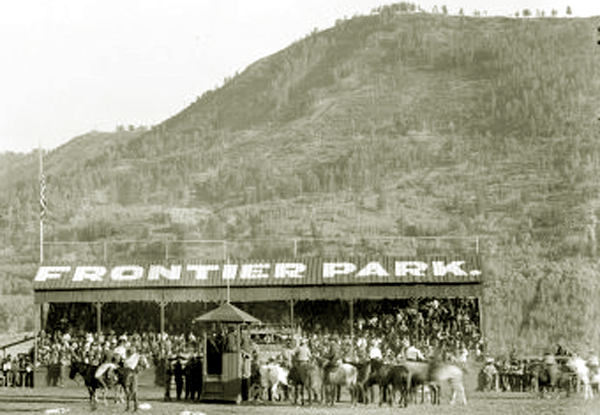
Grand Stands Frontier Park, Jackson. Photo by S. N. Leek.
Bucking elk were also featured in other rodeos of the day. Eddie McCarty's show had bucking elk among the stock
which he provided for the 1914 Natrona County Fair. Dances were held in both the Clubhouse as well as the Woodmen of the World Hall. In 1915 wild horses were rounded up to provide the stock.
The rodeo that year also featured a bucking steer named "Spot." Following the rodeo, the Jackson Hole Frontier Association which put on the rodeo
drove 15 of the broncos over the hill to the railroad where they were
sold along with Spot to Charles Irwin of the Irwin Brothers Wild West Show (See Frontier Days).
Following the World War I, the shw was
sponsored by the American Legion. Originally, the rodeo was called
"Frontier Days." Now it is called the Jackson Hole Rodeo. It still boasts that it is primarily local and that
"anyone who has the gumption can do it."
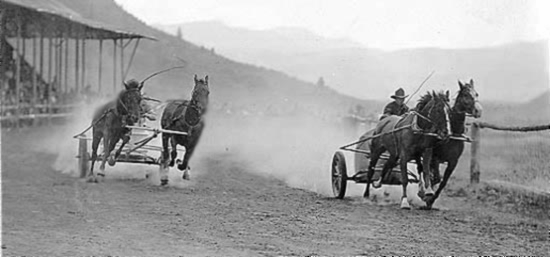
Chariot Race, Jackson Frontier Days Rodeo, undated
Over the years the rodeo grew and featured prominent riders who competed in other shows. One "semi-local" was
Earnest Emery, brother of Teton County Sheriff Olin Emery. Earnest completed on the rodeo circuit from about 1934 until about 1954 including appearances
in many of the rodeos in Idaho, Montana and Alverta where he completed in the Calgary Stampede.
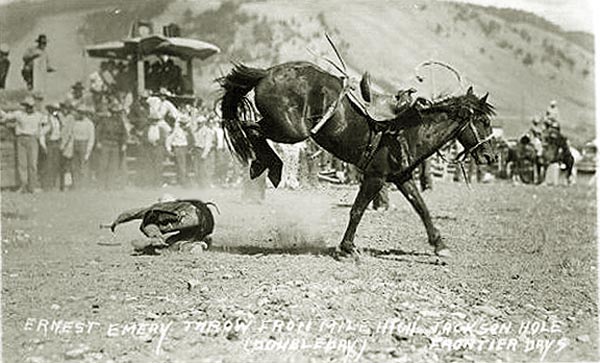
Ernest Emery being tossed at Jackson's
Frontier Days Rodeo, photo by Ralph Doubleday, undated.
For information as to Ralph Doubleday see Frontier Days.
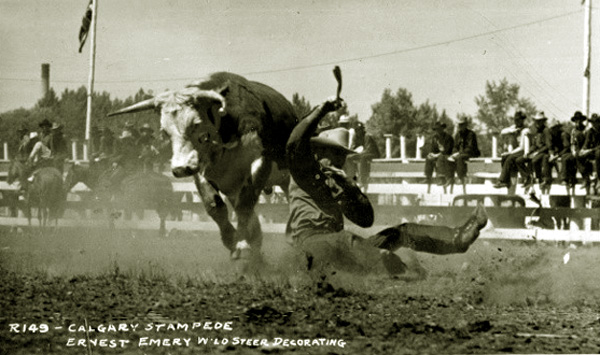
Ernest Emery being tossed at Calgary Stampede, 1944.
About 1955, Ernest moved to Missoula where he operated the Whistle Stop Drive-In Restarant on Brooks Street.
On February 15, 1959, he, his wife, Norma Jean, and his sister-in-law Leona Hefte went out for the evening leaving the children with a
babysitter. Allegely an argument ensued. They then went to the Elks Lodge and then returned home.
There the three were found shot, Norma Jean in the abdomen and Leona in the chest. Both were dead. Earnest was found unconsience on the living room floor with
a shot through his jaw and lacerations on his throat. Ernest was taken to the hospital. There,
the local police charged Ernest with the first degree murder of Norma Jean. Subseqently earnest was charged with Second Degree murder of Leona.
Earnest said that the last thing he remembered before waking up in the hospital was a flash. Shortly after the bodies were discovered,
the babysitter's boy friend committed suicide. It was the prosecutions's theory that Ernest shot the two women, self-inflicted the lacerations, attempted to cut his own
throat and then shot himself in the jaw.The defense contended that the trajectory of the shots came from the bedroom; that
to believe the prosecution, one would have to accept that Ernest fired the shots at his wife and sister-in-law, cut his throat, shot himself in the
jaw with a rifle and then crawled back into the living room. It was the Defense theory that the babysitter's boy friend fired all the shots and then committed suicide.
The Defense demanded from the prosecution the suicide notes left by the boy friend. The prosecution refused to allow the defense to review the notes or learn the contents.
The Montana courts ruled that the defense had no right to see the evidence in the hands of the prosecution.
In November 1959, Emery was tried for the first degree murder of Norma Jean. He was found not guilty. The prosecution in March of 1961 then tried
Emery for the second degree murder of the sister-in-law. He was again found not guilty. It is small consolation that two years later in
a seperate case, Brady v. Maryland, 373 U.S. 83 (1963), that the Defense's arguements were finally proven to be correct; that the prosecution is under
a duty to furnish exculpatory evidence to a defendant.
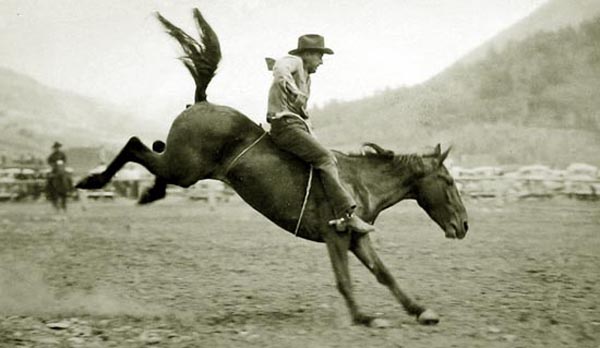
George Conwell, Jackson Hole Rodeo approx. 1938.
Another participant in the Jackson Rodeo was George P. Conwell (1914-1999) from the Fremont County area. George was a
working cowboy who worked on a number of ranches. In the mid-1930's he was active on the rodeo circuit ranging from Vernal, Utah, in 1937 to the Boston Garden
where he appeared in 1936.
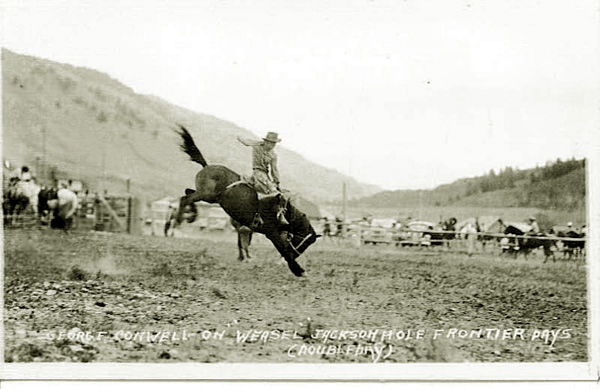
George Conwell being tossed by Weasel, approx. 1938.
It will be recalled that the 1936 Garden is where the cowboys went on strike leading to the formation of the Professional
Rodeo Cowboy's Association. See Frontier Days.
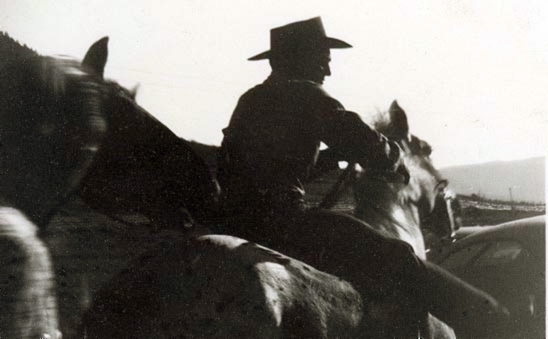
Rodeo, 1946, photo by Davey Harris courtesy of Scott Harris.
For discussion of Davey Harris see discussion on a subsequent page relating to the Cowboy Bar.
A handwritten note on the back of the
photo indicates that the cowboy is "Sheepherder Reynolds." Jackson has always been primarily cattle
country. Because of limited entry in the Hole, early Deadlines were easy to enforce. Even in the
1930's when sheep became the predominate stock in Wyoming, sheep were comparitively rare
in the Jackson area.
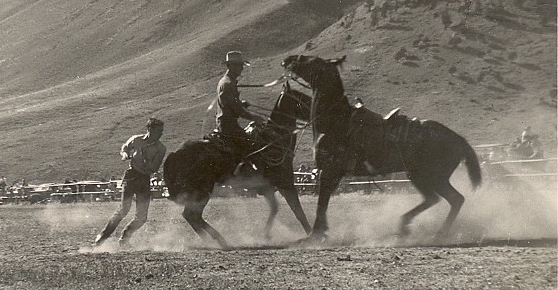
Rodeo, 1946. Photo by Davey Harris courtesy Scott Harris.
As later discussed, the major changes in Jackson came during the post-war years. The most significant changes have been to
the intersection of Broadway and Cache. The changes that have overcome Jackson have been critized. Amy Kiessling in the nomination of the Van vleck house to the National Register
noted the "frenzied drive to create 'a wild west image' that represents the communities [sic] role as a tourist town but not its early history."
See nomination p 9. Indeed, even the
New York Times has weighed in on the changes to Jackson. A story in The New York Times in reporting a collision between a
pickup truck and a polo pony began:
A pickup truck hit a polo pony here last week.The Truck won that skirmish between the Old West and the faux West. But in the
wider cultural collision here, the Old West is beating a retreat over Teton Pass to Idaho or down the Salt River to a
quiet town called Freedom.Brook James S: "Tourists Win Cultural Shootout in Jackson, Wyo.", New York Times, August 14, 1998.
No place are those comments more appropriate that the corner of Cache and Broadway. The intersection for years was marked by
the gas station and Richards Ford on the northwest corner. Both are gone now as are the buildings and
business which replaced them.
Indeed, in the immediate area surrounding the
Town Square there are only about five building which are recognizable from prior to World War II,
The Clubhouse, The Jackson Drug Store, The Teton Movie Theater, the Cowboy Bar, and the Wort Hotel
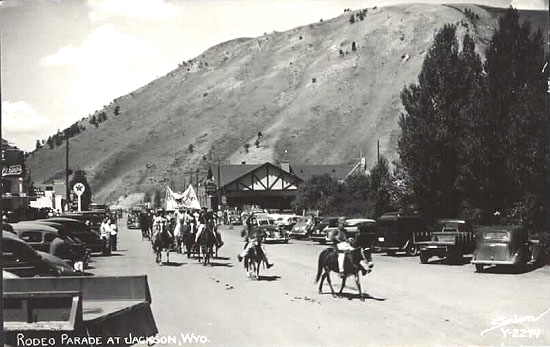
Rodeo Parade, Broadway, looking west toward intersection with Cache, approx. 1941.
The building with the half-timbered gable end is Richards Ford. Richards Ford was later replaced with Paul Hanson's Gifts and Jewelry store.
See next two photos.
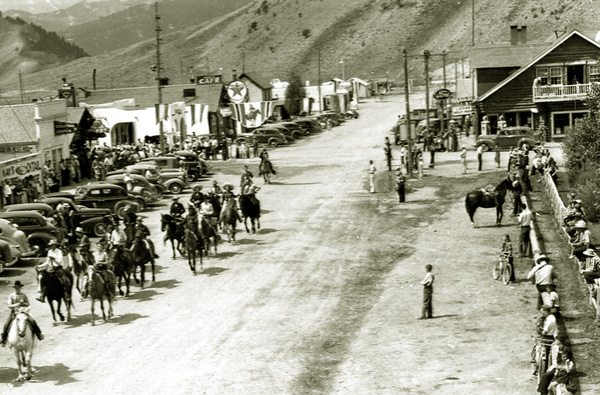
"Rodeo Parade. Broadway, intersection Cache and Broadway, looking west, approx. 1939
Music this page:
Pony Boy
Composer, Charley O'Donnell
Lyrics, Bobby Heath
Way out west, in a nest from the rest, dwelt the bestest little Bronco Boy
He could ride, he could glide o'er the prairies like an arrow.
Every maid in the glade was afraid he would trade his little heart away,
So each little peach made a nice little speech of love to him;
Pony Boy, Pony Boy, won't you be my Tony Boy?
Don't say no. Here we go off across the plains.
Marry me, carry me right away with you.
Giddy up, giddy up, giddy up, whoa! My Pony Boy.
Till one day, out that way, so they say, came to stay a fluffy ruffle girl.
She made eyes, she surprised, and he found his heart was lassoed.
When he thought he was caught, how he fought, but she taught this pony boy to love.
But he balked when she talked of a trip to New York, so she sang to him;
Pony Boy, Pony Boy, won't you be my Tony Boy?
Don't say no. Here we go off across the plains.
Marry me, carry me right away with you.
Giddy up, giddy up, giddy up, whoa! My Pony Boy.
Giddy up, giddy up, giddy up, whooooooa! My Pony Boy
Next Page: Jackson continued, the Shootout on the Square.
|